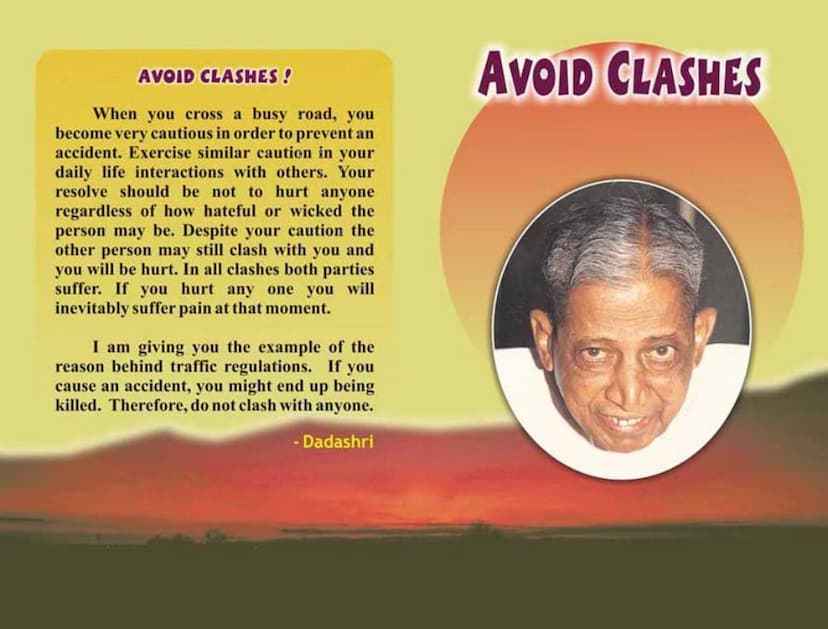Avoid Clashes
Added to library: September 1, 2025

Summary
Here's a comprehensive summary of the Jain text "Avoid Clashes" by Dada Bhagwan, based on the provided pages:
Core Message: Avoid Clashes for Peace and Liberation
The central tenet of "Avoid Clashes" is that by making a firm resolve to avoid conflict with anyone, regardless of their behavior, one can achieve profound peace, harmony, and ultimately, liberation. This principle is presented as a fundamental truth for living a happy and spiritual life.
Key Concepts and Analogies:
- Traffic Regulations as a Metaphor: The book uses the analogy of crossing a busy road. Just as one is cautious to prevent accidents, the same caution should be applied to daily interactions. The risk of a severe outcome (even death) in a traffic accident is compared to the subtle but significant damage caused by engaging in conflict.
- The "Wall" and the "Bull" Analogy: People who clash with you are compared to unyielding objects like walls or charging bulls. The wise course of action is to "get out of the way" rather than colliding, as resisting or confronting them will only lead to harm.
- "The Fault is of the Sufferer": This is presented as another key principle for liberation. It emphasizes that when conflicts arise, the responsibility lies with the person who gets hurt or embroiled. Instead of blaming others, one should accept personal fault, which leads to the solution.
- Distinction Between Tolerance and Solution: The book clarifies that avoiding conflict is not about mere tolerance. Tolerance has its limits and can lead to a forceful rebound. The true aim is to find a solution and understand the underlying causes of conflict.
- Vyavasthit (Scientific Circumstantial Evidence): While acknowledging that circumstances (Vyavasthit) play a role, the book warns against using it as an excuse for conflict. Vyavasthit is what brings about the settlement of past karmic accounts, and one should resolve these situations with equanimity, not by creating further conflict.
- Karma and Past Accounts: Conflicts are understood as a mechanism for settling past life karmic accounts. The other person is seen as an instrument for this settlement.
- The Subtle Nature of Conflict: Conflicts aren't just physical fights. They extend to mental disagreements, unspoken resentments, and even subtle judgments about others. The book outlines a progression from gross to subtle, subtler, and subtlest levels of conflict.
- Pudgal and Friction: Friction (clash) is attributed to "pudgal" (a complex of thoughts, speech, and actions) which is a mixture of consciousness and non-self. Pure pudgal does not cause friction.
- Pratikraman (Divine Apology): When conflicts do occur, the remedy is "pratikraman" – a sincere process of recalling the mistake (aalochana), apologizing (pratikraman), and resolving not to repeat it (pratyakhyaan). This acts as an antidote to aggression.
- Clash Depletes Spiritual Energy: Engaging in conflict drains spiritual energy and hinders progress. Conversely, avoiding clashes conserves and increases this energy.
- Intellect's Role: While intellect is necessary for worldly interactions, it can be dangerous on the spiritual path, leading to doubts and conflicts. It's advised to ignore intellect when it points to faults in a spiritual guide.
- Common Sense: True common sense, which is "applicable everywhere," arises from avoiding friction. It allows one to understand situations and people with clarity and detachment.
- Sexual Interaction as a Root Cause: The book suggests that sexual interaction is a significant root cause of conflict in relationships. Conquering sexual instincts leads to a state of conflict-free living.
The Teachings of Dada Bhagwan:
The book is presented as the teachings of "Param Pujya Dadashri" (Ambalal M. Patel), who experienced spontaneous Self-realization in 1958. He is described as a "Gnani Purush" (Self-realized being) who embodied the principle of "Dada Bhagwan" (The Lord within). His teachings are characterized as "Akram Vignan" (the step-less science or elevator path), a direct and scientific approach to spiritual realization. The current representative carrying on his work is Dr. Niruben Amin.
Practical Advice:
- Resolve Not to Hurt: Make a firm resolve not to hurt anyone.
- Observe and Move Away: When encountering difficult situations or people, observe them like a wall or a bull and move away wisely.
- Accept Fault: When a conflict arises, immediately accept that it is your fault.
- Find Solutions, Don't Tolerate: Focus on finding solutions to issues rather than just enduring them.
- Practice Pratikraman: Sincerely apologize and resolve not to repeat mistakes that lead to conflict.
- Maintain Detachment: Understand that others are instruments for settling karmic accounts.
- Guard Against Subtle Conflicts: Be aware of mental judgments and subtle criticisms of others.
- Use "Nav Kalamo" (Nine Priceless Vows): These powerful affirmations are provided as a means to develop the strength to avoid conflict.
In essence, "Avoid Clashes" offers a practical and profound spiritual path for achieving inner peace and liberation by transforming one's approach to interpersonal interactions. It emphasizes self-awareness, responsibility, and a scientific understanding of karma and human behavior.